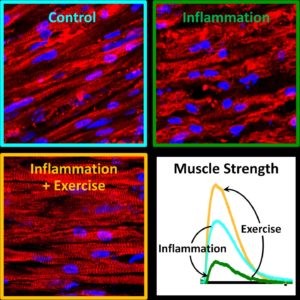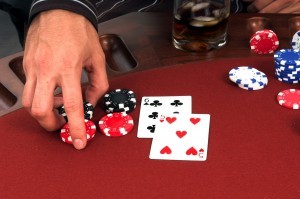Have you ever had one of those situations in life where somebody asks you a question of why something is and you can't put into words the explanation. For example, imagine a young toddler asking why is the sky blue? What would you say? How would you explain it? It's something we know to be true but hard to put into words. The same could be said for the benefits of exercise. We have known for a while that exercise helps with inflammation. But we didn't know which cell type(s) were involved? And could this help maintain strength? A research team at Duke University has been looking to answer this question. Specifically they wanted to see how effectively muscle cells would be at warding of chronic inflammation. This is different from acute inflammation that results from a specific episode such as a sprained ankle. When we roll an ankle playing pick up basketball there is an immune response to clear away cellular debris and helps the tissue heal. Other times inflammation can extend over long periods of time causing damage and weakening tissues i.e. rheumatoid arthritis and sarcopenia. This type of chronic inflammation induces muscle atrophy. Exercise can counter these negative side effects. The researchers were able to engineer muscle cells in-vitro i.e. in a petri dish. These cells were then exposed to interferon gamma for seven days. We normally see this chemical messenger elevated in muscle cells of those with chronic inflammation. After the seven day period of exposure to interferon gamma, to induce a situation of chronic inflammation, the researchers then stimulated the muscle cells electrically to make them contract. What they found was that the muscle cells that exercised i.e. that were electrically stimulated, did not show the effects of chronic inflammation. With long term inflammation, i.e. chronic...
12 Minutes of Exercise Improves Health
- Chris Collins
- Fitness
- 1736 Hits
- 0 Comments
-
This summer we got a puppy. And the interesting thing about puppies is that they don't really have a concept of time. I could come in at the end of the day and the puppy is excited to see me, wagging her tail and weaving in between my legs for contact and comfort. The same reaction could happen if I'm working in another room for a bit and rejoin the puppy and family wherever they are. The puppy doesn't distinguish between an 8 hour or a 20 minute absence. Our kids are a little smarter than the dog, although sometimes I wonder? And they have a slightly better concept of time. But they will still ask to go outside and play with their friends minutes before we're due to head out the door for a family function. Or after pajamas and brushing their teeth they'll ask if we can start a movie. But puppies and kids can be excused if they don't know time or how long things should take. Adults however know what an hour is, how long things take and how to manage their day. When it comes to exercise a common challenge is making the time to be active. We might assume that for a health goal to be realized requires a certain amount of daily fitness to achieve it. Intuitively I would guess most people think they need to exercise an hour a day. Now there's nothing wrong with training an hour daily. And if you're already in the habit than definitely keep going. But for those that aren't that active and haven't gotten started yet because they haven't carved out those 60 minutes per day, a new study should give them hope. The study was part of the Framingham Health Study and included over 400 participants....
When Protein + Veggies Don't Work
- Chris Collins
- Nutrition Advice
- 1815 Hits
- 0 Comments
-
Life is rarely a series of absolutes. There are few times when we always 'do this' or never 'do that'. Oftentimes an answer to a question from a client might be prefaced with 'it depends...'.And this is not meant to be a cop out. For example let's look at a few examples.If a young athlete asks if they should be taking a particular supplement the answer might begin with 'it depends'. How old is the athlete? What does their nutritional profile look like? Is the supplement being considered safe and effective? And are there other ways to achieve the same outcome by tweaking the athlete's eating habits before investing in a supplement?Or another client might ask if they should add sprints to their training program to enhance fat loss. Rather than a outright yes or no we might ask the client if they have any current joint pain or injuries. Sprinting puts exceptional stress through the feet-ankles-knees-hips and low back. An individual with current issues at these joints may realize additional pain and problems from an activity with high velocity and impact.Additionally we might want to know how this person moves? Have they already been doing some high speed running? How old is the client that is considering sprinting? What type of footwear and surface will they be sprinting on? And what other training will this individual be doing in the days prior and after some sprint training?In other words this is not Vegas and simply a condition of whether or not to double down on 11. It's not that cut & dry.[caption id="attachment_4530" align="aligncenter" width="300"] One of the few absolutes in life.Consider as well the notion to eat only protein and veggies.On the one hand this sounds very simple and possibly effective in terms of a healthy nutritional approach. By eating...
4 Reasons to Ditch Corn
- Chris Collins
- Fitness
- Nutrition Advice
- 1926 Hits
- 7 Comments
-
The other day I was talking to a client telling them they could accelerate their fat loss efforts by eliminating certain foods from their nutritional plan.And so I mentioned things like starchy carbohydrates (breads, potatoes, pasta, rice, cereals, grains), most drinks as well as food with corn.But as soon as I mentioned the word 'corn' this client stopped me. 'Really?' they said. 'I can't eat corn? Why not?' It's a vegetable and it comes from the earth.And herein lies the problem with some of the nutritional rules I have passed on to clients. Some are borrowed from others. Some are our own creations at Okanagan Peak Performance Inc. Now without going into the entire list here are couple of the rules:* eat as many vegetables as you like* foods from the ground, the ocean or a tree are good food for youJust considering these two rules we would all probably agree that these two rules would lead you in the right direction regarding a nutritional choice. Because corn is a vegetable that comes from the ground.So what's the big deal with corn? Why is it on the list of foods to avoid?I can see how this gets confusing. And the quick answer is to say there are exceptions to the rules. But that is kind of like a parent saying to a five year old 'just because' as part of suitable explanation.Well you aren't five years old and 'just because' won't cut it. We need better reasons than that to cut corn from the program. So with that in mind here are 4 Reasons to Cut Corn From Your Nutritional Plan.Reason #1 - Is It a Vegetable?The first thing to consider when it comes to corn is that depending on who you ask or what resources you use it may be considered a...

